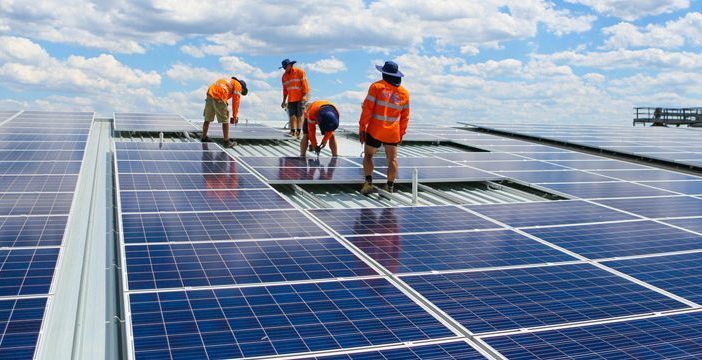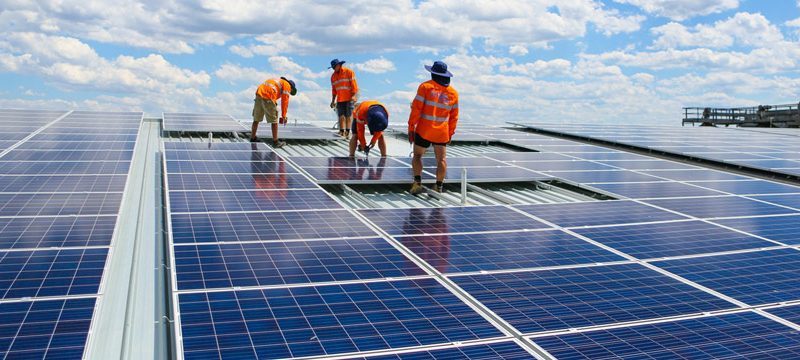
Commercial solar developers working in Queensland are breathing a sigh of relief after a rushed state government solar rule change that had thrown the industry into chaos was overturned late on Wednesday.
As RenewEconomy reported, the controversial rule – which as of May 13 required only licensed electricians to mount and fix solar panels on projects of 100kW and over – was declared “invalid” in the Queensland Supreme Court, after a legal challenge by a solar farm developer.
The case was brought by managers of the ready-to-build 35MW Brigalow Solar Farm in Queensland’s south-east, with the support of the Clean Energy Council and other industry heavyweights.
Common sense has prevailed and this silly regulation has been thrown out. It would have cost regional Queensland dearly, and put the state’s clean energy target at risk. Look forward to sitting down with the Gov for consultation 2.0 https://t.co/cSJoXgIiUr
— Anna Freeman (@FreeAnna1) May 29, 2019
According to court documents, the new rule would have added around $2.6 million to that project’s cost, and required the hiring of around 60 licensed electricians, in place of unskilled labourers.
But the price – both in added project costs and delays – was also expected to be hefty for the state’s booming commercial solar sector, where the majority of projects would have been subject to the new rule.
“We have more than 40 projects in Queensland larger than 100KW, which would have been in jeopardy as a result of this regulation,” said Smart Commercial Solar’s Huon Hoogesteger in comments on Wednesday.
“Had this not been countered so effectively by our industry, commercial solar would have been badly set back in Queensland just as it is really beginning to grow and jobs would have been lost.”
Quite apart from the cost, and the impact on project viability, commercial solar developers saw the rule change as unjustified, and as a direct attack on the solar industry.
“This just smells and feels like a cheap shot at large-scale solar and a sleight of hand way to control it,” Danin Kahn, the CEO of Todae Solar, told One Step in April.
“Commercial installations are already very carefully governed by safety rules and regulations.
“It will just significantly increase the cost, significantly increase the process – and even if you could afford all of that, there just wouldn’t be enough capability.
“It’s like saying that when we build a house we need licensed electricians to even lay the bricks.
“There wasn’t proper consultation carried out in this process. This is just a cheap way of curtailing growth of large-scale solar.”
Jack Hooper, whose large commercial solar business GEM Energy operates almost exclusively in Queensland – and who worked closely with the CEC to demonstrate why the rule change was unnecessary and potentially devastating – had just a few choice words about yesterday’s outcome:
“Glad to see common sense prevailing. …The ruling was a joke in the first place.”
Supreme Court rules invalid the Queensland Government’s attempt to mandate that only electricians can mount solar panels for 100kW+ systems. Such a ridiculous requirement, thank goodness sense has prevailed. https://t.co/d8dClvhl1l
— Tristan Edis (@TristanEdis) May 30, 2019
But they’re not out of the woods yet. The Queensland government on Thursday afternoon announced it would appeal and apply for a stay of the Court’s decision, so that while the technical legal matters were resolved, the new safety measures would be maintained.
“My department and their legal advisors have reviewed the written judgement overnight and advised me that there are solid grounds for appealing the decision,” Queensland’s minister for industrial relations, Grace Grace, said in a statement.
Minister Grace also said the appeal would based on legal technicalities, and had nothing to do with the safety argument – even though that remained the government’s focus.
“When it comes to electrical safety there are no second chances. The safety of workers in this industry was the government’s motivation for developing these regulations and remains our motivation for appealing yesterday’s decision,” she said.
Electrical Safety Commissioner Greg Skyring has welcomed the government’s decision to appeal the decision, which he said put workers installing solar panels at risk of “electrical shock and fire.”
“Contrary to some of the commentary I’ve seen in the media, these risks are very real and very serious and they need to be addressed,” he said.
These views are supported by the Queensland chapter of the Electrical Trades Union – thought to have been the main driver behind the introduction of the rushed rule.
“As a union we have worked tirelessly to expose the widespread unsafe practices on solar farms, while this decision is a kick in the guts for safety and for quality regional jobs, it will not end the battle,” said ETU state secretary, Peter Ong.
“The (solar) industry is on notice, they will be held accountable, we will never take a backward step on safety,” he said.
This is not the view of Master Electricians Australia, however – despite the key industry body being part of the original “steering group of technical and safety experts” established last July to advise government on the solar farm safety code.
In a statement released two weeks ago, MEA chief Malcolm Richards lambasted the rule change, which he said was vastly different to what industry had been told would be implemented.
“The government promised to consult with the industry, and paid lip service to that idea. But the devil is always in the detail, and now we can see the detail is no good,” Richards said.
“Our members didn’t do a four-year electrical apprenticeship so they could lift heavy solar panels.
“These new regulations add nothing but red tape to solar farm installations. They don’t enhance safety, they don’t improve performance and they don’t boost clean energy production,” he said.
“What they will do is drive up the cost of building a new solar farm, and tie up electrical businesses in unnecessary regulation.”
Meanwhile, the Clean Energy Council has indicated that it is ready and willing to work collaboratively with the relevant state departments and key industry stakeholders on different approaches to improving safety on big solar installations.
“The solar industry recognises that safety is paramount, but this new regulation did nothing to improve the safety of workers and was not justified by the government’s own safety data,” said the CEC’s head of energy generation, Anna Freeman, on Wednesday.
“Any future changes should be formulated in consultation with the industry and all relevant stakeholders, and should be based on evidence.
“We look forward to working with the Queensland Government to help achieve our shared aims of safely delivering on its 50 per cent renewable energy target by 2030,” she said.

Sophie is editor of One Step Off The Grid and deputy editor of its sister site, Renew Economy. Sophie has been writing about clean energy for more than a decade.



